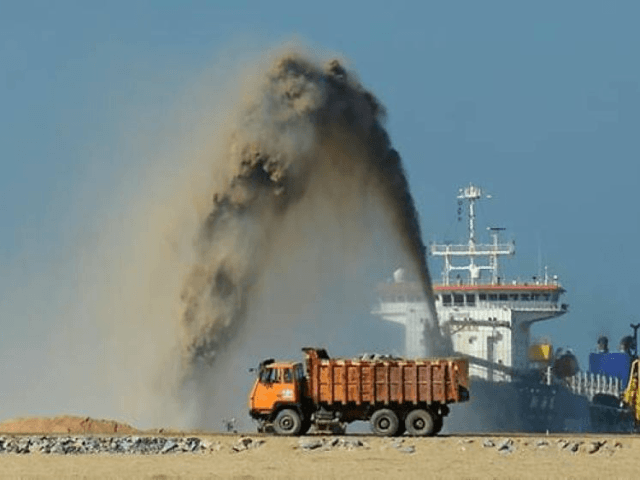China’s Foreign Ministry issued a statement on Friday denying allegations that its financial assistance programs for Pacific nations are an effort to buy political influence and muscle out regional competitors, especially Taiwan.
The Foreign Ministry insisted China’s $5.9 billion in pledged foreign aid comes with no strings attached.
The statement was sent to Reuters, which noted China’s foreign aid to Pacific nations in the current decade trail just behind Australia’s. If China meets all of the pledges it has made, it will provide almost a third of the aid provided to the region by 62 international donors.
Reuters cited the work of Australia’s Lowy Institute, which is monitoring Chinese spending while Beijing prosecutes a campaign to diplomatically isolate Taiwan, and the U.S. is teaming up with Australia and Japan to compete with China’s Belt and Road infrastructure program. The Lowy Institute’s analysis found Australia and China “ramping up tit-for-tat donations” in a regional charity war.
The Chinese Foreign Ministry said China only wishes to promote the healthy economic development of neighboring countries:
“As a developing country, China fully understands the special difficulty Pacific island countries face in achieving sustainable development,” the ministry said in a statement sent to Reuters.
China “provides what aid it can on the basis of respecting the wishes of the island nations without attaching any political conditions, vigorously promoting socio-economic development”, it added.
“China’s aid is aimed at promoting the well-being of the people of the island nations, and strengthening their ability to develop sustainably, without seeking any personal gain, and it is also not aimed at any third party,” the ministry said.
The Lowy Institute created an interactive map showing who provides the most foreign aid, and where the money is going. Australia’s ABC News touted the map as a “surprise” because while much attention has been focused on China’s soaring pledges, Australia is still far and away the leader in actual money delivered. China and New Zealand are roughly tied for second place.
Comments from Lowy researchers and Australian officials quoted by ABC give the reader a good idea of why the Chinese Foreign Ministry felt obliged to publish a statement denying its mercenary motives:
Jonathan Pryke from the Lowy Institute said it proves Australian aid is “critically important” to the Pacific.
“Our foreign aid equates to roughly about 3 percent of regional GDP.
“And our engagement is stitched into the fabric of these countries, in governance, in health, in education, in humanitarian support. You name it, we’re probably involved in it.”
Foreign Minister Julie Bishop said the Lowy map demonstrated the depth of Australia’s commitment to the Pacific.
Without directly mentioning China, Ms. Bishop also raised several common criticisms of Beijing’s aid program.
“As the region’s major development partner Australia encourages investments that ensure local communities are sustained, that labor forces are used and don’t impose onerous debt burdens on local communities,” she said.
The Australians have been very concerned about what International Development Minister Concetta Fierravanti-Wells derided as “roads to nowhere” China is financing on Pacific island nations. In other words, the Australians are warning smaller regional powers that China will trick them into taking out loans they can never repay and using the resulting financial leverage to control them.
As ABC pointed out, China funds fewer projects in the region than Australia, but the Chinese works tend to be huge—about ten times as expensive as the average Australian initiative—and therefore attract a great deal of attention.
Two important unspoken points to be added are that because China’s projects are “roads to nowhere,” as Fierravanti-Wells put it, they will never generate enough income to repay loans furnished by Chinese banks, no matter how generous the terms; and because the Chinese projects are extravagant, they provide more opportunities for graft than Australia’s smaller, more reasonable, more carefully managed initiatives. China’s adventures in debt imperialism have a way of being very lucrative for the ruling political elite in the nations Beijing financially colonizes.
Another problem is that Australia has noticed other free-world countries are donating less money to the Pacific, perhaps in part because China is locking down its dubious claims on the South China Sea and reducing the number of lucrative development opportunities available for other nations. ABC’s report concludes with a warning that Australia might grow weary of shouldering the full financial burden of competing with China unless other countries pitch in.
The Australian, on the other hand, cited hopeful developments such as Australia snatching away a major Pacific internet cable project from China’s Huawei, the growing U.S.-Japanese-Australian initiative to compete with Belt and Road, a new Aussie pledge to help build government and communications infrastructure in Samoa, and Australia’s promising effort to edge the Chinese out of a security deal with Vanuatu.

COMMENTS
Please let us know if you're having issues with commenting.